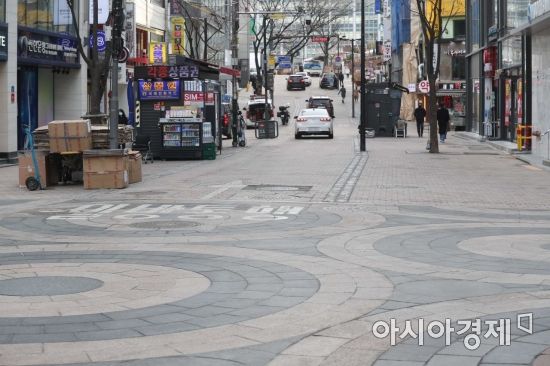
On the 18th, a duty-free shop in Terminal 1 of Incheon International Airport is crowded in the aftermath of a novel coronavirus infection (Corona 19). / Reporter Moon Ho-nam munonam@
[세종=아시아경제 김현정 기자] As the number of foreign tourists sharply declined due to the spread of Corona 19, the tax-free industry, which was hit hard, is suffering from a headache ahead of paying patent fees. This is because the Customs Act was revised to reduce patent fees if the National Assembly suffered damage in a disaster situation, but the government to implement it was in a situation where it had to pay a fee of around 50 billion won without revising the enforcement rules.
According to the National Assembly and the Ministry of Strategy and Finance on the 21st, the Tariff Act (176 Article 2-4), revised in December last year, stipulates that the related patent fees can be reduced if there is significant damage to the business of bonded stores due to a national disaster. This bill was originally initiated to support the duty-free shop industry struggling with Corona 19.
However, despite the passage of the law, the amount of patent fees paid by companies due to pay next month has not changed. This is because the Ministry of Knowledge Economy has not prepared follow-up measures such as how to reduce patent fees. The patent fee is determined in March based on the previous year’s sales, which is about 0.1 to 0.5% depending on sales. From 0.05% of sales until 2016, the current rate has jumped from 0.1% to 1% due to the revision of the enforcement regulations of the Customs Act in 2017. When the sales of the duty-free industry reached an all-time high of 24.858.6 billion won in 2019, only three top companies such as Lotte, Shilla and Shinsegae paid a patent fee of 73 billion won.

The streets of Myeong-dong, Jung-gu, Seoul, during lunchtime on the 4th, when measures to ban the gathering of five or more people from gathering privately were spread across the country. / Reporter Moon Ho-nam munonam@
This year, due to Corona 19, the duty-free industry is in a situation where it is in fact on the verge of existence. Based on the number of entrants, the number of Chinese tourists in January fell 98.5% compared to the same period last year. In the third quarter of last year, when the number of corona19 confirmed patients had plunged, it recovered to the 97% level, but the footsteps stopped again. However, it seems that the Ministry of Knowledge Economy has decided that additional reduction or exemption measures are not necessary because the natural decrease in patent fees occurs as sales decrease. At a plenary meeting on the 16th, Deputy Prime Minister Hong Nam-ki and Minister of Economy, Trade and Energy said, “Last time, (the National Assembly) changed the law, and the grounds were laid out when a member of the Democratic Party requested the relevant measures. “It wasn’t included this time,” he said. “The law opened the door to the extent that the fee could be reduced, and this time it was judged that the patent fee was significantly reduced.”
According to the Korea Duty Free Shop Association, last year’s duty-free store sales are expected to decline by 37.6% from the previous year (2019) to only 15,5052 billion won. Since the remaining sales were also in the form of leaving only minimal profits to maintain business partners with each brand, operating profits are expected to be around 500 billion won. The patent fee to be paid by the duty-free industry is expected to be around 50 billion won.
An industry insider explained, “Last year, sales were at the level of inventory, but not a structure that could make profits through sales.” Another official said, “Patent fees are not a simple concept of fees, but because they have a strong quasi-tax nature, reductions are essential,” he said. “Even large companies are considering reducing their duty-free shop business, and some companies are delaying entering stores.” An official from the Ministry of Science and Technology said, “We are currently reviewing the establishment of enforcement rules, but no decision has been made.” If the Ministry of Knowledge Economy does not prepare a separate enforcement rule, each duty-free shop must pay the patent fee in accordance with the existing rate by the end of next month.
Meanwhile, the government is expected to extend special employment support for certain industries, such as aviation and duty-free, in consideration of the prolonged damage of Corona 19. Last year, the government designated eight businesses as special employment support businesses, including travel, air, and other tourism transportation businesses, tourism accommodation, performances, air ground handling, duty-free shops, airport buses, and exhibition and international conference businesses, as special employment support businesses. · Up to 90% of the labor costs resulting from leave are supported in the name of employment maintenance subsidies. The designation period was extended once in August of last year and is nearing the end of the period at the end of next month.
Reporter Kim Hyun-jung [email protected]
